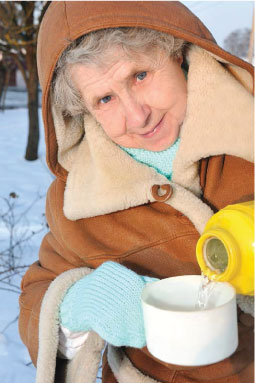
Winter is rarely a wonderland. Often, it’s a harsh season fraught with numerous health and safety risks. For senior citizens and people with dementia, the cold-weather months can be particularly perilous. Such groups need to take particular care throughout the season. Here are some tips for doing that:
Get a flu shot. People who are older or who are in poor health have a higher risk of hospitalization and death due to the flu—and winter is when the illness usually peaks. Make sure both you and your loved one get an annual flu shot. Ask your doctor if a pneumonia shot is also recommended.
Stock up on essentials. In case you become homebound during a winter storm (or you just want to avoid venturing out into the cold), make sure you have enough groceries, water, toiletries and other staples at home. If bad weather is in the forecast, be sure to attend to any upcoming prescription refills your loved one may require. Make sure you have plenty of blankets, flashlights and nonperishable foods on hand in case your power goes out. If your home gets too cold and you or your loved one is showing signs of hypothermia, call 9-1-1 right away. (See sidebar for signs of hypothermia.)
A nutritious diet with lots of fruits and vegetables can help improve your physical and mental resilience during the winter months.
Try to keep the winter blues at bay.
Winter can be a depressing season for anyone, but for people with Alzheimer’s disease who are also prone to sundowning, it can be particularly unsettling. Try to diminish the impact of reduced daylight by doing the following for your loved one:
- Limit caffeine and sugar to the early morning hours.
- Increase physical activity, like helping with chores around the house.
- Discourage naps during the daylight hours.
- Reassure your loved one calmly when he or she is upset
- Invest in a light therapy lamp, if you can afford it.
- Encourage a hobby.
Select season-appropriate clothing. People with Alzheimer’s disease often dress unsuitably when they’re responsible for clothing themselves. Depending on which stage of the disease your loved one is in, you should assist in dressing or at least supervise his or her wardrobe choices. Layered, lightweight clothing is best for cold weather—especially indoors. Outside, be sure your loved one always has a warm coat, hat and gloves or mittens.
Ensure your home is heated safely. The older we get, the harder it is for our bodies to appropriately regulate temperature. As a result, older adults may turn the thermostat up too high, potentially leading to dehydration and—for people with dementia—further confusion. If you or your loved one gets cold in your climate-controlled home (ideally set at 65-70 degrees, depending on the age of your home and how well it heats), opt for an extra layer of clothing before cranking the heat up higher. If you’re using other heating devices in your home, be sure you take steps to reduce the risk of a house fire. You can do so by keeping space heaters clear of flammable objects, installing carbon monoxide and smoke detectors, purchasing a fire extinguisher, getting a checkup for your chimney’s flue pipe and placing a glass screen in front of a wood-burning fireplace. You should also always supervise your loved one when he or she is in a room with a fire, space heater, kerosene lamp or other potentially hazardous heating device.
Keep your car prepared for the weather. The last thing you want is to be stranded in the cold—especially if you’re with a loved one who has dementia. To ensure you’re safe when you leave home, make sure your car has been properly serviced and winterized. If possible, avoid leaving home when there is snow and ice on the roads. On the off chance that you do experience car trouble in the elements, make sure your car is already stocked with blankets and a charged cell phone.
Prevent falls. With obscured, slippery and uncertain surfaces, winter is a prime season for falls. Such accidents are particularly dangerous for the elderly, who are more prone to broken hips. To reduce the likelihood of falls, make sure your loved one wears shoes with non-skid soles. In addition, you should only allow him or her to walk on surfaces that are completely clear of snow and ice. Avoid going outside after dark, and if a building you’re entering or exiting has handrails, use them.










